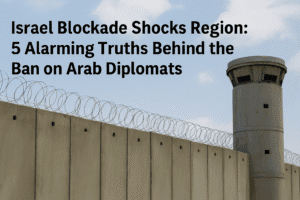Israel Blockade Shocks Region: 5 Alarming Truths Behind the Ban on Arab Diplomats
Israel’s blocking of a high-level Arab diplomatic delegation from visiting Palestinian leaders in Ramallah is a significant political act. The unprecedented visit, featuring Saudi Arabia’s Foreign Minister for the first time in memory, aimed to coordinate support ahead of a crucial international conference on Palestinian statehood co-led by France and Saudi Arabia. This ban directly undermines that initiative, reflecting Prime Minister Netanyahu’s firm opposition to statehood.
Crucially, it complicates Saudi Arabia’s delicate balancing act between pursuing potential normalization with Israel and demonstrating Arab solidarity with the Palestinians. The move starkly reinforces Israel’s absolute control over access and political space within the occupied West Bank, where movement restrictions and military raids have intensified since the Gaza war began. For the Palestinian Authority, denied this rare show of high-level Arab backing, it underscores its profound vulnerability under occupation. Ultimately, this incident exposes the deep contradictions hindering peace and dims prospects for a viable two-state solution.

Israel Blockade Shocks Region: 5 Alarming Truths Behind the Ban on Arab Diplomats
The planned visit was unprecedented: a delegation of Arab foreign ministers, including Saudi Arabia’s Prince Faisal bin Farhan, traveling to the occupied West Bank city of Ramallah. Their mission? To meet Palestinian President Mahmoud Abbas ahead of a crucial international conference on Palestinian statehood. Yet, in a stark move underscoring the deep fractures in the region, Israel barred their entry, leaving diplomatic corridors buzzing and Palestinian hopes bruised.
More Than Just a Cancelled Trip:
A Rare Gesture Blocked: High-level Arab diplomatic visits inside the occupied West Bank are exceptionally uncommon. Saudi Arabia’s Foreign Minister, Prince Faisal bin Farhan, would have been the first in recent memory. This wasn’t routine diplomacy; it was a significant, visible act of Arab engagement with the Palestinian leadership in their own territory, signaling potential shifts in regional priorities.
The Shadow of June’s Conference: The timing was critical. The ministers aimed to coordinate with Abbas just weeks before a major conference in New York, co-led by France and Saudi Arabia, explicitly focused on advancing the creation of an independent Palestinian state. Israel’s move is widely seen as a direct attempt to undermine this initiative, reflecting Prime Minister Benjamin Netanyahu’s vehement opposition to Palestinian statehood.
Saudi Arabia’s Delicate Dance: Saudi Arabia’s planned participation is particularly telling. While publicly considering normalization with Israel (a long-sought goal for Netanyahu), Riyadh has simultaneously ramped up financial support for the Palestinian Authority (PA). Sending their top diplomat to Ramallah highlights the kingdom’s attempt to balance potential future relations with Israel against its historical support for the Palestinian cause and Arab consensus. Israel’s refusal complicates this delicate balance.
Israel’s Tightening Grip: The ban is not an isolated incident. It occurs against a backdrop of Israel dramatically intensifying its control over the West Bank since the Gaza war began:
- Increased military raids and checkpoints, severely restricting Palestinian movement.
- Displacement of tens of thousands from northern West Bank cities.
- Demolitions and new military outposts. Blocking high-profile diplomatic access reinforces the reality of Israeli authority over Palestinian lives and political space within the occupied territory.
The PA’s Precarious Position: For President Abbas and the PA, the blocked visit is a profound setback. Dependent on international and Arab support, particularly financial aid like that recently increased by Saudi Arabia, the PA’s legitimacy is already strained by Israeli restrictions and Hamas rivalry. Being denied the opportunity to host such significant Arab backing publicly underscores its limited autonomy under occupation, even as it attempts reforms requested by donors like Saudi Arabia.
The Ripple Effects:
Israel’s decision sends unambiguous signals:
- To the Palestinians: The path to statehood remains blocked, and their leadership’s ability to engage internationally on their own soil is subject to Israeli veto.
- To Arab States: Normalization with Israel, while potentially economically attractive, remains politically fraught without significant concessions on the Palestinian issue. Israel’s action demonstrates a resistance to international pressure for Palestinian rights.
- To the International Community: It highlights the immense difficulty of advancing peace initiatives like the upcoming June conference when a core party actively obstructs diplomatic engagement central to the process.
The Road Ahead:
The blocked delegation casts a long shadow over the New York conference. It demonstrates Israel’s determination to resist international momentum towards Palestinian statehood, even at the cost of embarrassing key Arab players. Meanwhile, Saudi Arabia faces heightened pressure: can it genuinely champion the Palestinian cause while pursuing ties with an Israel that actively thwarts Palestinian diplomacy? The incident starkly illuminates the deepening contradictions and hardening positions that make the prospect of a viable two-state solution seem increasingly distant. The real casualty is not just a cancelled meeting, but the fading hope for a negotiated peace built on mutual recognition and Palestinian self-determination.
You must be logged in to post a comment.